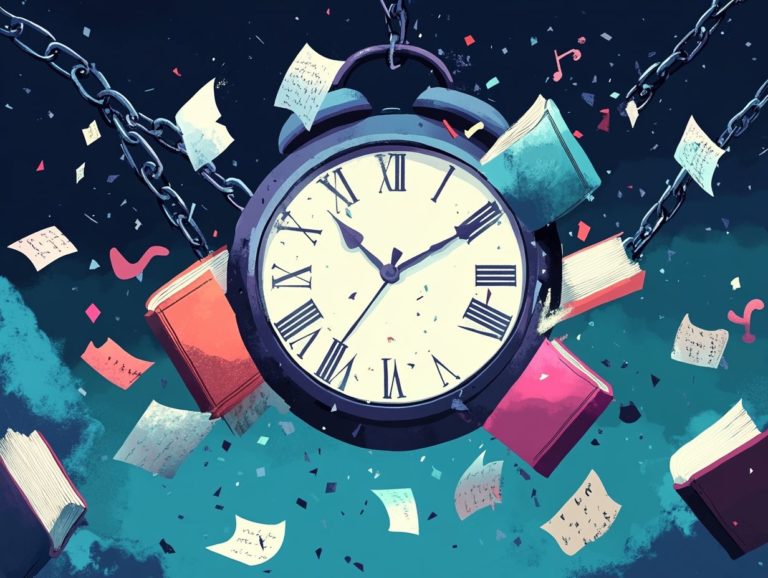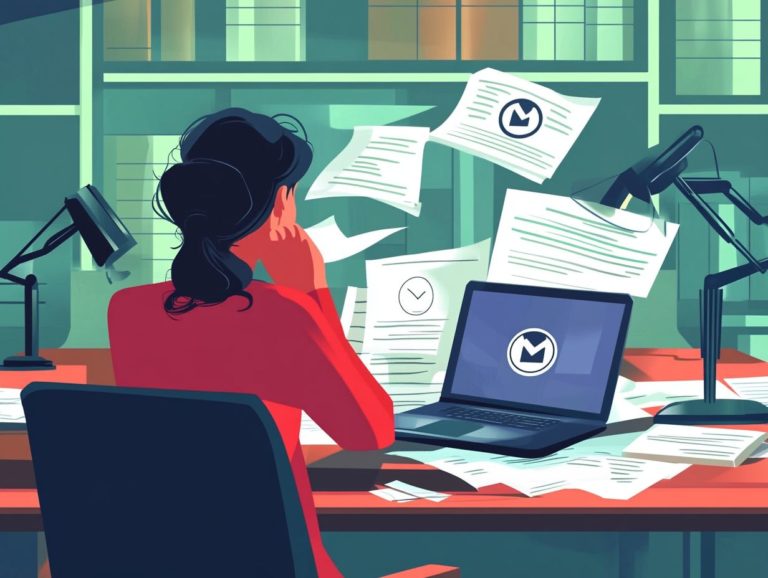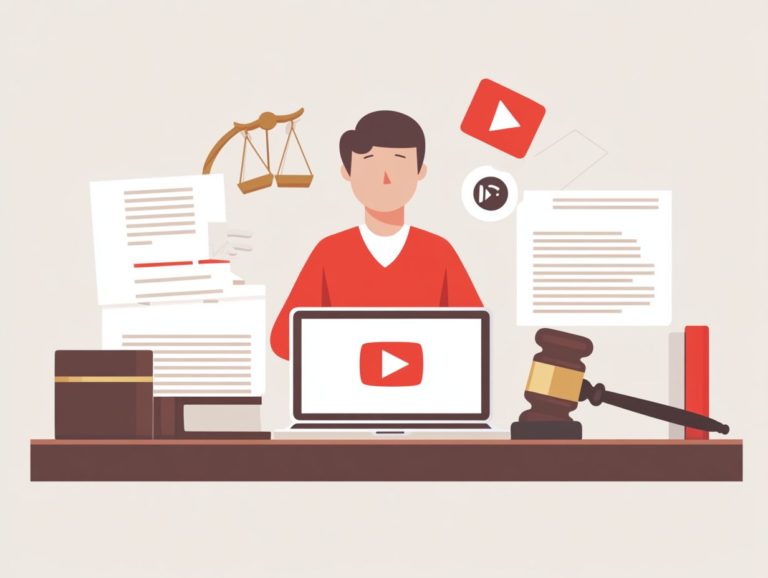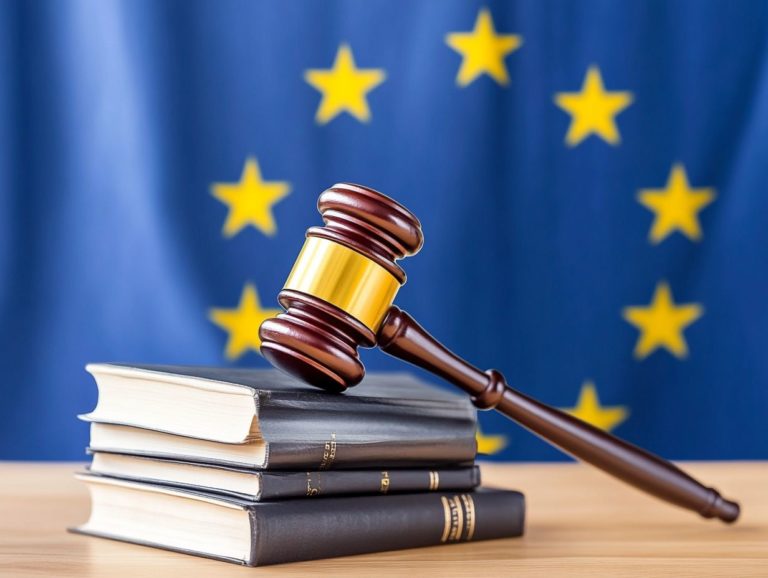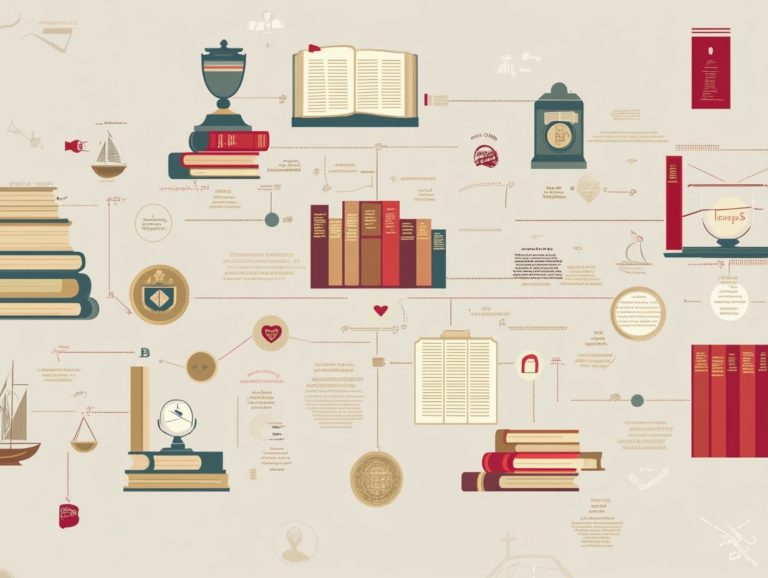The Role of Copyright in Online Education Platforms
Copyright laws are fundamental in shaping the realm of online education. Knowing copyright laws is vital for educators and students. They protect your original works and inspire creativity in the digital world.
As educational resources increasingly transition to digital platforms, understanding copyright laws becomes essential for both educators and learners. This article highlights the importance of copyright in online education. It safeguards intellectual property rights, promotes fair use, and addresses issues like plagiarism and piracy.
By exploring best practices for compliance, you are equipped to navigate the complexities of copyright in your online learning endeavors. Act now to ensure compliance!
Contents
- Key Takeaways:
- Understanding Copyright Laws
- The Importance of Copyright in Online Education
- Challenges and Controversies Surrounding Copyright in Online Education
- Best Practices for Copyright Compliance in Online Education
- Frequently Asked Questions
- What is the role of copyright in online education platforms?
- Why is copyright important in online education platforms?
- How Can Copyright Be Used in Online Education Platforms?
- What Happens if Copyrighted Material is Used Without Permission?
- Are There Exceptions to Copyright in Online Education?
- How Can Online Education Platforms Follow Copyright Laws?
- Why is Copyright Important in Online Education?
Key Takeaways:
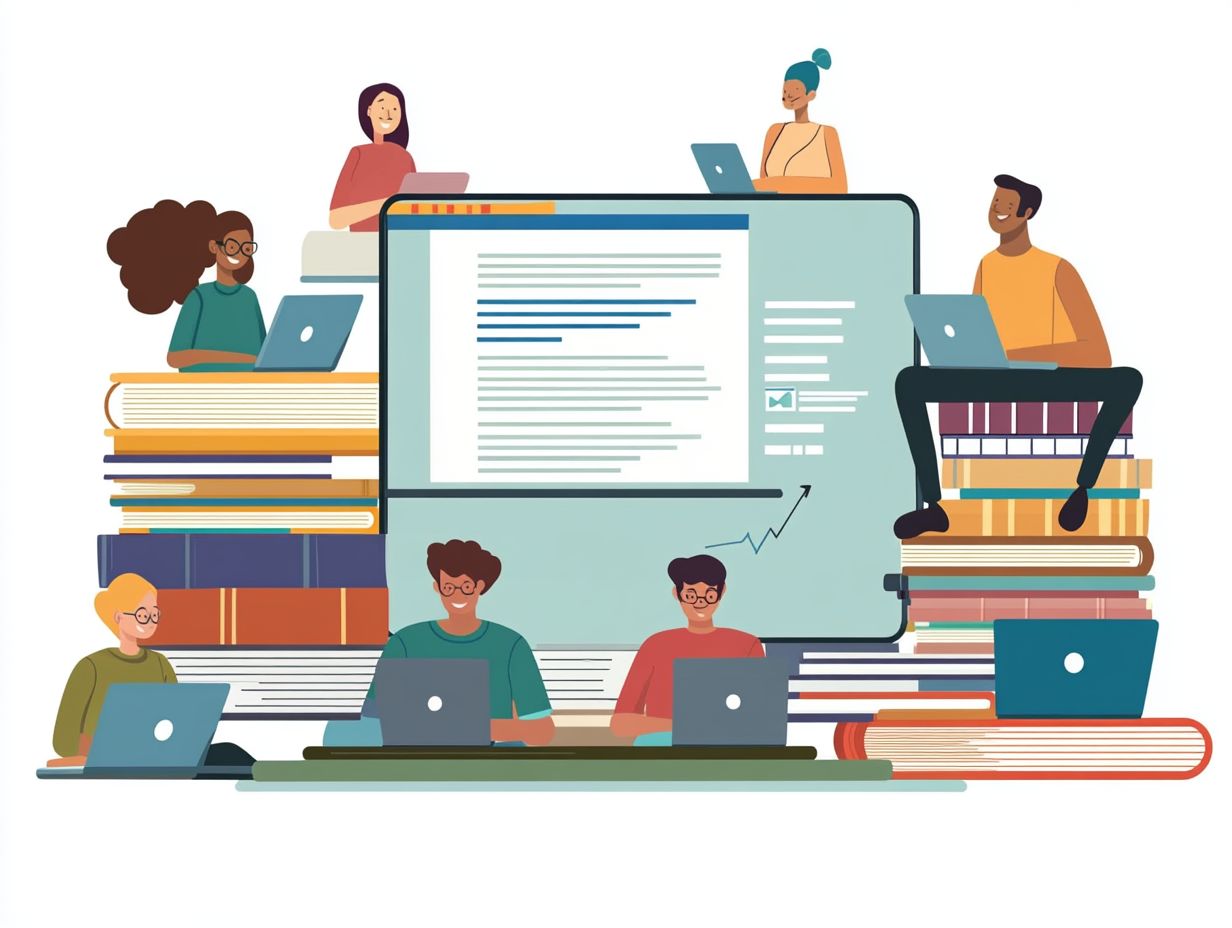
Copyright laws protect the original works of creators, including educational materials, on online education platforms. They play a crucial role in promoting fair use and protecting intellectual property rights. Educators and students should be aware of copyright guidelines and utilize available tools and resources for compliance in online education.
Understanding Copyright Laws
In the realm of online education, copyright laws dictate how institutions and instructors can engage with copyrighted material. This ensures they remain compliant when using teaching resources, government documents, and artistic creations.
Navigating this complex legal framework protects the rights of copyright owners while enabling transformative uses of content to enrich learning experiences.
What is Copyright?
Copyright is a law that grants you exclusive rights to your original works, whether they be literature, artistic creations, or digital content. This gives you the power to control how your creative expressions are used and distributed.
Emerging in the late 15th century with the invention of the printing press, copyright has evolved significantly, shaped by historical demands to protect intellectual property and foster creativity. Today, it encompasses a diverse array of works, including performances, audiovisual projects, and software, reflecting advancements in the digital age.
For educators and students alike, understanding copyright is essential. You’ll need to learn the rules for using copyrighted materials in your classrooms and projects carefully. While fair use allows certain uses without permission, exercising caution is key to avoiding infringement.
How Does it Apply to Online Education Platforms?
In online education, copyright laws guide how you can legally utilize copyrighted materials, such as instructional resources and media content. This legal framework protects you as an educator and ensures your students are safeguarded while fostering creativity and upholding intellectual property rights.
Consider the importance of licensing agreements; they grant you the necessary permissions to use textbooks, videos, and images in your virtual classrooms. Without these contracts, you risk infringing on copyright laws, facing serious legal consequences.
Understanding the fair use doctrine is essential for instructors, as it allows you to utilize short clips or excerpts for educational purposes without needing permission, provided you adhere to established guidelines. For example, in online courses featuring brief video segments for analysis, as long as these clips are transformative and used within an educational context, you can incorporate them legally.
The Importance of Copyright in Online Education
The significance of copyright in online education is paramount. It serves as the foundation for protecting intellectual property rights, ensuring educational institutions can deliver high-quality instruction without encroaching on the rights of copyright holders.
With this legal framework in place, you can responsibly share resources, promote fair use in your classroom, and foster the creation and spread of educational content that enriches both teachers and students alike.
How to Protect Intellectual Property Rights in Education
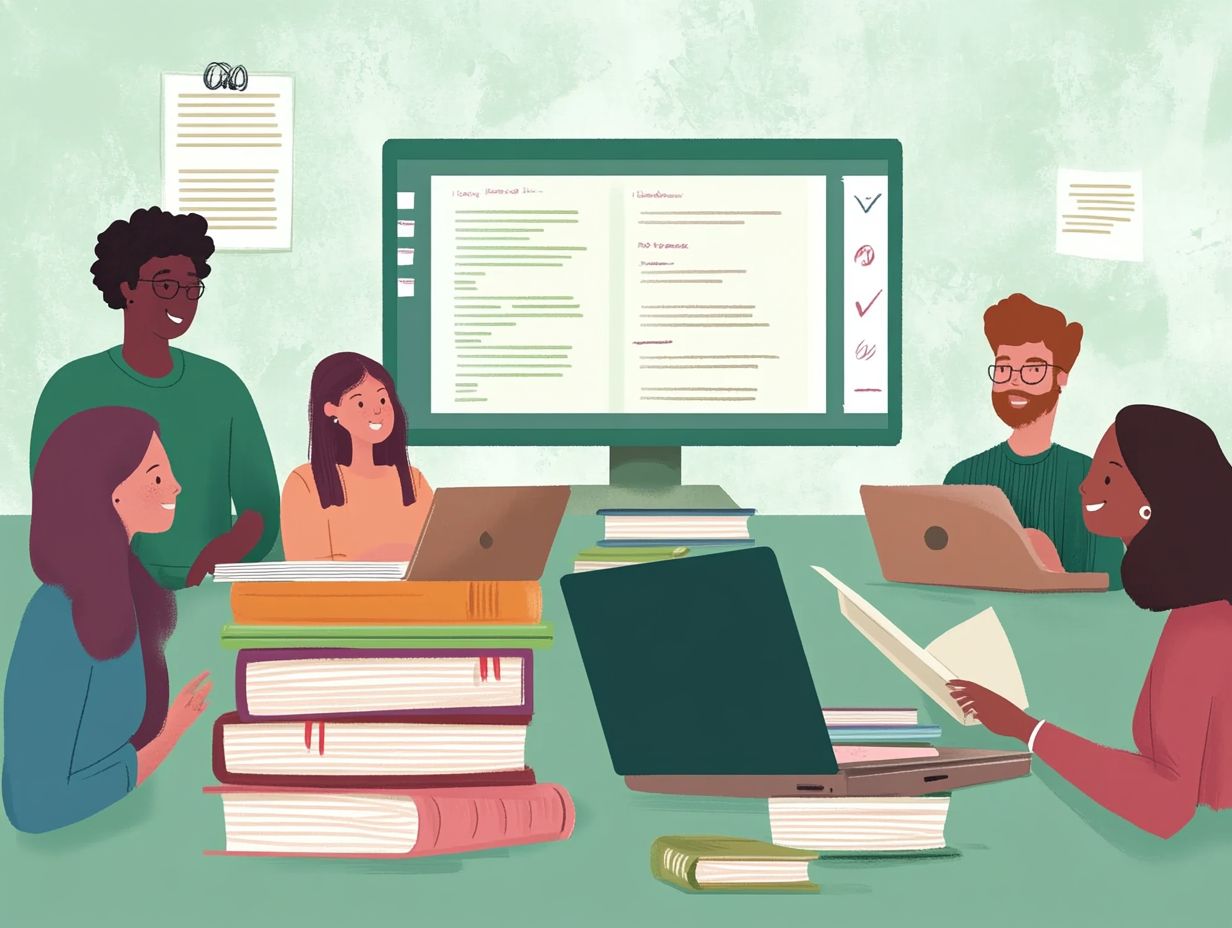
Protecting intellectual property rights is a cornerstone of copyright law. It gives creators the power to maintain control over their works.
This is particularly crucial for educational institutions that depend on these materials for effective teaching and instruction.
In today s digital landscape, navigating the intricacies of copyright is more important than ever for institutions that seek to encourage creativity while following legal rules.
As an educator or administrator, you must implement robust compliance strategies that include well-defined policies regarding the use of copyrighted materials.
Training programs that inform both staff and students about copyright regulations are essential.
Consider the example of a university that successfully defended its right to use a selection of scholarly articles under fair use, which allows limited use of copyrighted material without permission. This case highlights the importance of institutions actively protecting their intellectual property while also advocating for educational access.
Act now to ensure the legal rights of creators and users are protected!
Promoting Fair Use and Creative Commons
Promoting fair use and Creative Commons, a licensing system that allows creators to share their work legally, is essential for you as an educator.
These concepts give you the power to utilize copyrighted materials for educational purposes without violating copyright laws, fostering a vibrant culture of content sharing and collaboration.
By understanding these principles, you can enhance your learning environments by integrating a variety of resources think videos, articles, and images into your lesson plans.
For instance, you might draw from Creative Commons media available on platforms like Flickr or Wikimedia Commons, ensuring your students engage with current and relevant content.
In an online course, consider sharing a podcast episode licensed under Creative Commons. This allows your learners to analyze it in discussions while honoring the original creator s rights.
Additionally, by leveraging fair use like using brief excerpts from films or articles for critique you can spark critical thinking and navigate the complexities of copyright responsibly.
Challenges and Controversies Surrounding Copyright in Online Education
The challenges and controversies surrounding copyright in online education are complex and multifaceted.
Issues such as plagiarism and piracy present significant risks for both educators and students.
These challenges often spark debates over ownership and access, compelling educators to navigate the delicate balance between leveraging copyrighted materials and adhering to copyright laws to steer clear of violations.
Issues with Plagiarism and Piracy
Issues surrounding plagiarism and piracy pose significant challenges for educational institutions. These practices not only violate copyright laws but also erode the integrity of the learning environment.
With the abundance of digital resources at their fingertips, students often find it all too easy to access and replicate others’ work without giving proper credit, raising profound ethical questions.
Educators face the daunting task of instilling a sense of responsibility and originality in their students.
When students resort to dishonest practices, it not only tarnishes their character but also opens the door to severe academic consequences, including the possibility of expulsion.
Simultaneously, institutions risk losing credibility and encountering legal troubles if they fail to enforce compliance with copyright regulations.
Therefore, cultivating a culture of academic integrity becomes essential for developing a sustainable online education environment that fosters respect for intellectual property.
Understanding and addressing copyright issues is crucial for enhancing the educational experience. Learn more about copyright compliance to enhance your teaching methods today!
Debates on Ownership and Access
The ongoing debates surrounding ownership and access to content prompt you to consider the delicate balance between copyright protection and the necessity for accessible educational resources in online learning environments.
This tension presents significant challenges for educators. You aim to deliver a comprehensive curriculum while navigating the intricate maze of copyright law. As a result, students may find their learning experiences hindered by restrictions that limit access to essential materials.
Explore practical solutions like open educational resources (OER)! These options can create a fairer learning environment.
Tackling these complexities allows you and other stakeholders to work together toward a system that honors copyright while promoting inclusive access to knowledge. This effort ultimately enriches the learning experience for everyone involved.
Best Practices for Copyright Compliance in Online Education
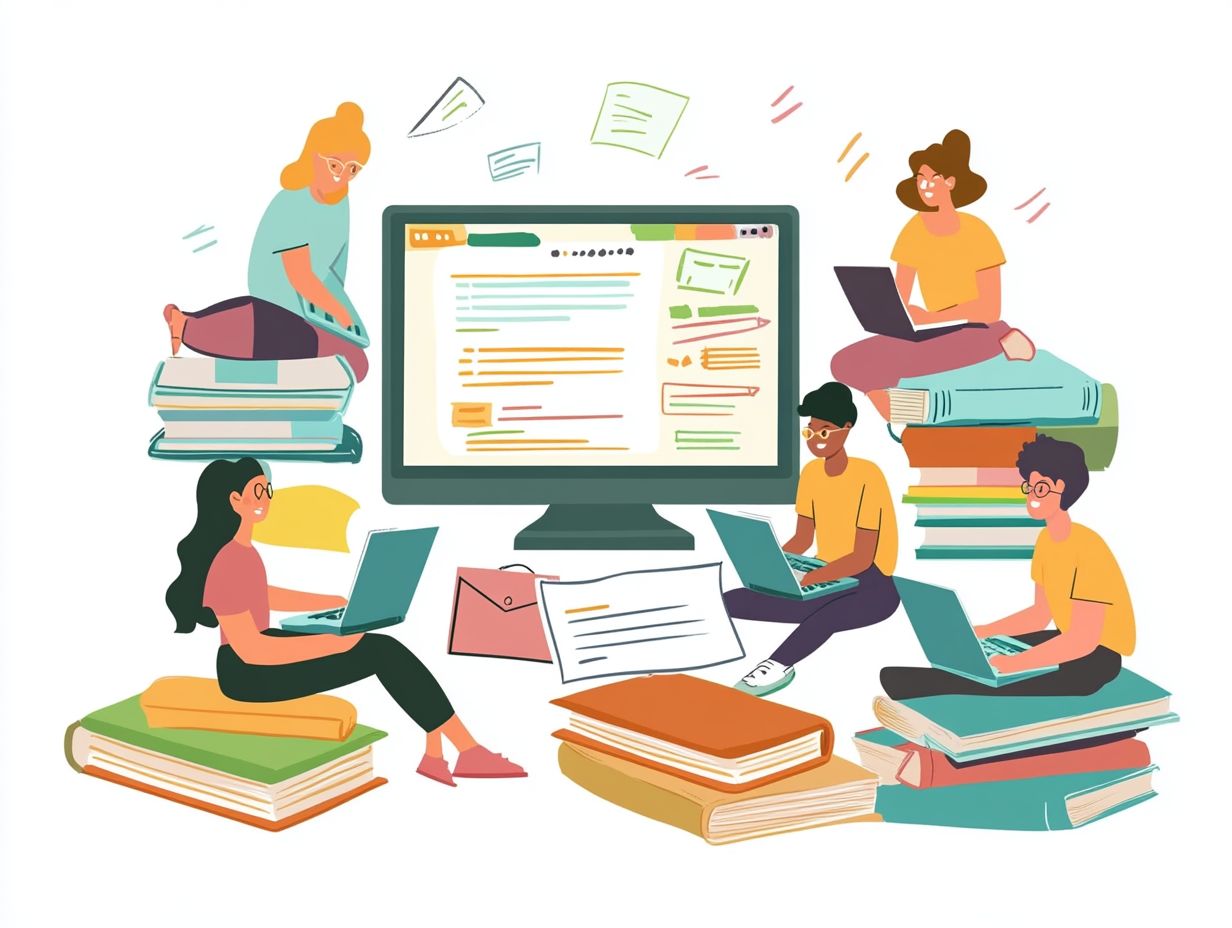
Implementing best practices for copyright compliance in online education is crucial for you as an educator who aims to utilize images and other copyrighted materials while honoring the rights of creators.
By grasping the nuances of licensing agreements, which are rules about how you can use someone else s work, and carefully following copyright laws, you can elevate your teaching strategies without jeopardizing your integrity or risking copyright infringement.
Guidelines for Using Copyrighted Materials
Establecer pautas claras para el uso de materiales con derechos de autor es esencial para ti como educador, asegurando que mantengas un uso legal mientras aprovechas contenido valioso para fines educativos.
Entender las leyes de derechos de autor es fundamental en tu campo. Estas leyes protegen a los creadores mientras te empoderan para mejorar tu ense anza.
Familiarizarte con el concepto de uso justo es clave; fair use allows limited use of copyrighted material without permission for educational purposes. Por ejemplo, usar un breve extracto de una novela para an lisis en tu clase de literatura podr a considerarse uso justo. Sin embargo, exhibir un cap tulo completo o distribuirlo sin autorizaci n no lo ser a.
Tambi n deber as explorar materiales con licencia de Creative Commons, que ofrecen mayor flexibilidad. Al reconocer estas matices, estar s bien preparado para navegar por las complejidades del copyright, enriqueciendo en ltima instancia las experiencias de aprendizaje de tus estudiantes.
Tools and Resources for Educators and Students
Utilizing tools and resources tailored for educators and students can significantly enhance your ability to navigate copyright protection and media sharing.
These resources empower you to discover legally available content, igniting creativity and collaboration in your classroom. One standout initiative is Creative Commons. Act now to take advantage of it! This provides licenses that enable you to share and remix educational materials legally.
By integrating Creative Commons resources, you gain access to a vast selection of images, videos, and texts that align with your learning objectives, all without the anxiety of copyright infringement.
Platforms like Pixabay and Unsplash offer a treasure trove of copyright-free images. Tools such as Google Advanced Search allow you to filter content by usage rights. Together, these resources create a dynamic environment where knowledge can be shared responsibly and innovatively.
Frequently Asked Questions
Here are some common questions about copyright in online education.
What is the role of copyright in online education platforms?
The role of copyright in online education platforms is to protect the rights of content creators and ensure that their work is not used without their permission. This includes protecting against plagiarism, unlawful use of copyrighted material, and ensuring fair compensation for content creators.
Why is copyright important in online education platforms?
Copyright is important in online education platforms because it allows content creators to have control over their work and protect it from being used without their permission. This, in turn, encourages the creation of high-quality educational content and ensures fair compensation for its use.
How Can Copyright Be Used in Online Education Platforms?
Copyright provides clear guidelines for using materials. It s essential to obtain permission from creators and to give proper credit to the original sources.
What Happens if Copyrighted Material is Used Without Permission?
Using copyrighted material without permission can lead to legal action. This could result in penalties, fines, and damage to the platform’s reputation.
Are There Exceptions to Copyright in Online Education?
Yes, there are exceptions. Fair use allows limited use of copyrighted material for educational purposes, along with open access and public domain materials.
How Can Online Education Platforms Follow Copyright Laws?
Online education platforms should have clear policies for using copyrighted material. They must obtain permissions and regularly monitor content to ensure compliance.
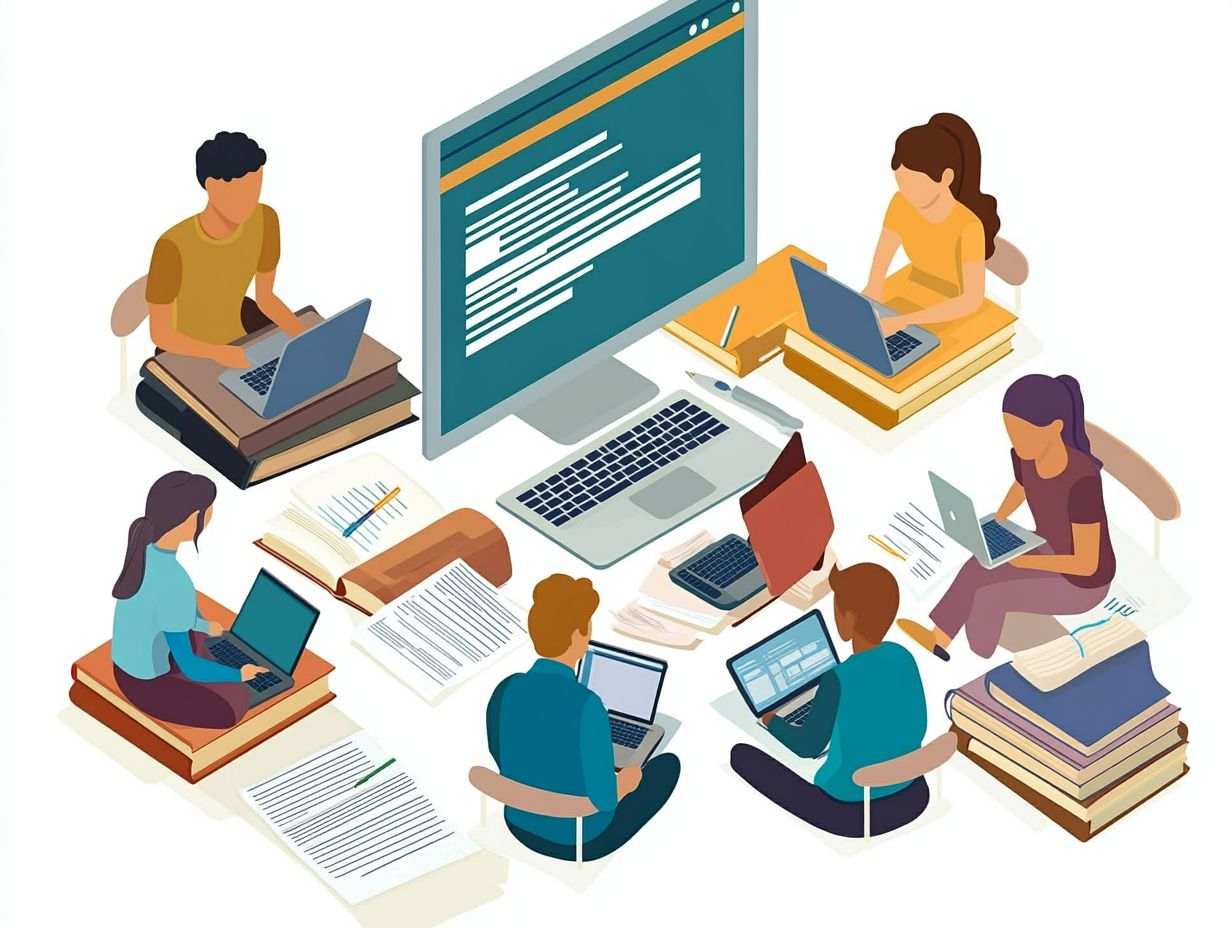
Why is Copyright Important in Online Education?
Understanding copyright is crucial for anyone involved in online education! It allows creators to control their work and protects them from unauthorized use.

